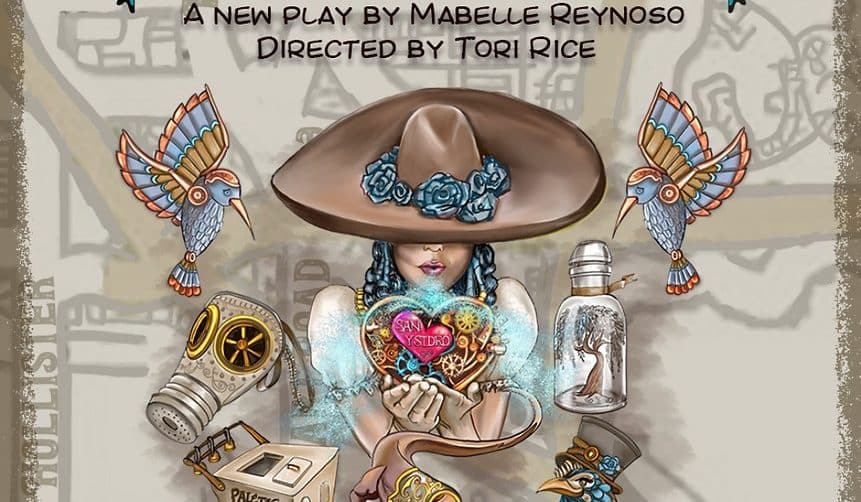
The panel at SDCC ’24 kicked off with panelists, Mabel Reynoso (Indigenous and Latinx Public Art: Transforming Theater Plays into Comics), Johnny Bell Contreras (Kumeyaay Public Artist), Zulema Reynoso (cartoonist and educator), and Arturo Medina (actor, activist, artist). Let’s first discuss Mabel’s stage play We are the air, A steampunk fairy tale set in the borderlands, it tells the story of a young woman who returns to her hometown of San Isidro in search of a cure to save her sister and her community.
The analogy is obvious because Mabel and Zulema are both true sisters and collaborators. Many of their life experiences play a key role in their stage plays. Mabel said: “I think we’re both excited. I talk about us regularly because we’re sisters and we’re 13 months apart. We’ve been working together since I was born. It makes the show possible, but it’s It really starts in North Grant, far south of the border.
She went on to explain how the grant was awarded to 60 artists in San Diego and Imperial counties to create campaigns about issues affecting under-resourced communities. Maybelle Reynoso and Contreras are both grant recipients and must work with community organizations.
Reynoso felt she had to tell this story because that’s why they were all there. Reynoso recognized Johnny from their panel live-streamed online during the pandemic and asked him to help her play. She joked that while it might have been considered a stalker, when she saw he was living in El Centro and going to an organization called Casa Familiar in San Ysidro, she followed .
Maybelle added, “San Ysidro is the busiest land crossing on the Mexican border in the Western Hemisphere. We took a walking tour of the neighborhood and at one point, there was an elementary school and the playground ended right off the highway. When I heard that , I knew immediately that I wanted to write a play about air.
This is important because the playground is right next to the highway and 60,000 cars pass by it every day and you can see the pollution in the valley. Born in Tijuana, Reynoso has had to cross borders her entire life, but she never stopped to think about the air. Reynoso began doing research, writing scripts, and then began working with young people. She gave a youth workshop in Seattle talking about the importance of showing up in theater. Johnny Bear gave a powerful talk on what it means to be an artist, and young people were given the opportunity to write their own scenes based on what they wanted to change in their communities.
Reynoso concludes: “There is something very powerful and I think it is very important. Young people create in order to have their work respected and rigorously praised, respected and performed by professional artists.”
Zulema Reynoso then took over the reins and went on to talk about how this influence contributed to the design of the play, especially the costumes. “In terms of context, the actual script inspired my imagination and creativity in conceptualizing the material,” she said. “Steampunk,” she said, “and I couldn’t agree more. I’m thinking of something visually exciting and in the theater Working with other adults in the project was huge for us and we gave viewers of the video a very vivid experience. Zulema explains how this led to exploring environmental themes and building some green and bio-inspired buildings.
Later, Johnny Bell Contreras, a member of the San Pascual Tribe of Cumeayai, shared his perspective. “It’s a learning process now and it’s a great thing. You can get creative in the room. Again, I have to thank San Diego County and some of the other facilities that help facilitate this,” he said. Especially Casa Familiar as a hub. It needs to happen on more levels, as you mentioned, and where certain groups, especially around the border areas, are underrepresented.
Arturo Medina had a lot to say about it, it was heartbreaking that he had to leave San Isidro because of a tragic event 40 years ago, a story that he has only now made public. Meeting Mabel made him more open and expressive. He had no theater before, he was not an actor, but he wanted to be a storyteller, a writer. Somehow, in a different way, he became the actor he wanted to be. It’s a different way of telling a story, but that’s not a bad thing – just a different approach.
He ended with a profound statement: “It’s amazing when your words are acted out on stage and put into action. Representation matters. When I first heard someone say my words on stage At that time, I was shocked.
If the impact on these creators wasn’t enough, Sister Reynoso decided to take on another job. They needed the story to engage children and influence children to want to see theater and invest in the arts. The answer seemed clear to them because of their shared experiences as children. They’re going to make a comic book we are air.
Mabel Reynoso emphasized the importance of the comic book, saying, “Comic books will outlast stage plays because stage plays, live theater, where you can see the recordings, say see where anyone can do it The recording is a comic, and the comic carries the story. That’s why it’s very important for us to make a comic book.”
Stay tuned for more coverage from SDCC ’24 beat.
related


